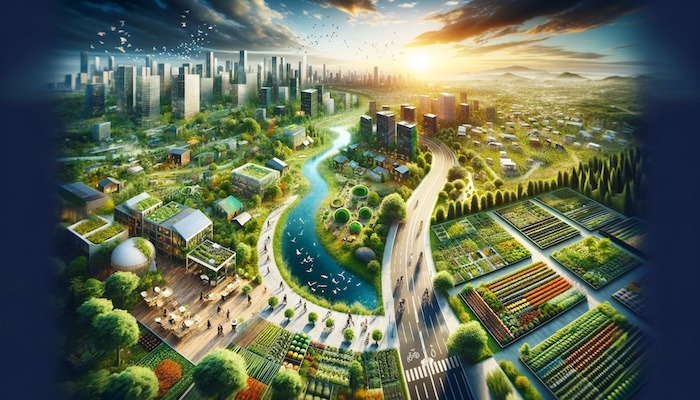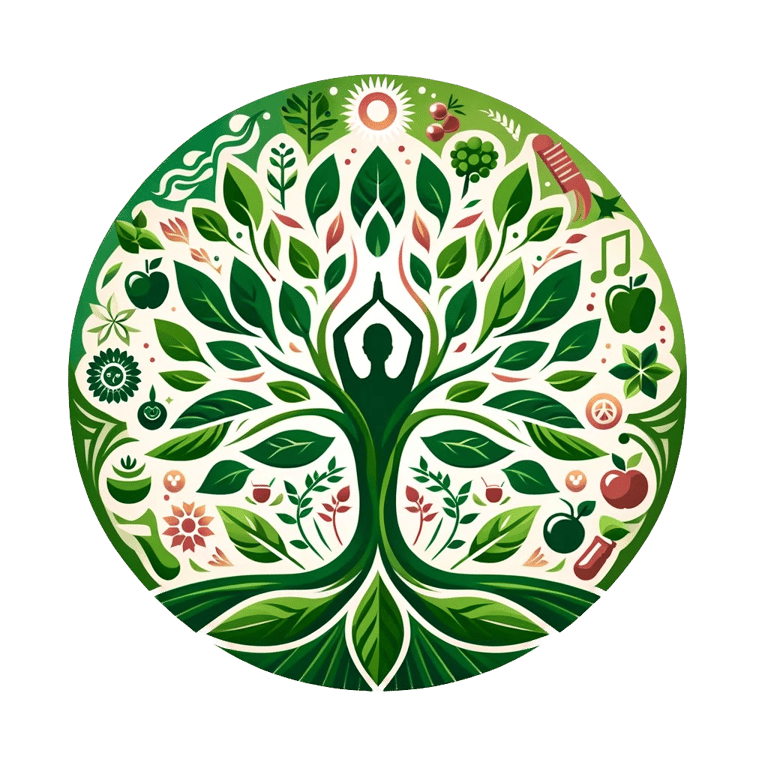
Challenges and Solutions in Sustainable Healthy Living
Bruce Gibson ND
7 min read


Challenges and Solutions in Sustainable Healthy Living
Challenges and Solutions.
This information introduces modern challenges in Sustainable Healthy Living and permaculture along with its benefits, and how to apply it in various scenarios. At a time of significant ecological, environmental, sociological and personal changes as a society and individuals, we are evermore in need of strategies and real-life things we can do to make positive changes. Permaculture and the concepts of sustainable healthy living can help provide the context and resources for a safer, happier, healthier life for all.
Suppose humanity does not follow a path that aligns with the principles and practices outlined in this Book. In that case, we may face several dangers and threats that can have far-reaching consequences for the environment and human well-being.
Some of these dangers include:
1. Environmental Degradation: Continued environmental degradation will intensify without adopting sustainable practices. Deforestation, soil erosion, water pollution, and loss of biodiversity will accelerate, leading to the destruction of ecosystems and the disruption of delicate ecological balance. This can result in the collapse of ecosystems, reduced availability of clean water, and increased vulnerability to natural disasters.
2. Climate Change: Failing to address climate change and reduce greenhouse gas emissions can have catastrophic effects. Rising global temperatures, extreme weather events, sea-level rise, and disruptions to rainfall patterns will impact agricultural productivity, water availability, and overall ecosystem health. This will lead to food shortages, increased conflicts over resources, and the displacement of communities.
3. Food Insecurity: Unsustainable agricultural practices, reliance on monocultures, and the depletion of natural resources can lead to food insecurity. The loss of fertile soil, water scarcity, and reduced biodiversity will make it challenging to produce enough nutritious food to feed a growing global population. This will disproportionately affect vulnerable communities and exacerbate social inequalities.
4. Loss of Resilience and Adaptability: By disregarding sustainable practices, societies become less resilient and adaptable to change. Dependence on finite resources, centralised systems, and fossil fuels hampers the ability to respond to shocks and disruptions. Lack of self-sufficiency and community cohesion can result in vulnerability during times of crisis.
5. Health Risks: Environmental degradation and unsustainable practices can contribute to health risks. Exposure to toxic chemicals, air and water pollution, and the loss of natural spaces can increase respiratory problems, waterborne diseases, and mental health issues. Additionally, biodiversity loss can disrupt natural disease control mechanisms and increase the risk of zoonotic diseases.
6. Social Disconnection: Disregarding sustainable practices can deepen social disconnection and weaken community bonds. Reliance on globalised systems, urban sprawl, and disconnected lifestyles can lead to social isolation, disengagement, and a diminished sense of belonging. This can have adverse effects on mental health and overall societal well-being.
Not following a path aligned with the principles and practices outlined here jeopardises our planet's future and future generations' well-being. However, we can mitigate these dangers and threats by embracing sustainable living, regenerative practices, and community collaboration.
We have the opportunity to create a more resilient, equitable, and harmonious world where humans and Nature can thrive together. The choice lies in our hands.
Benefits of Embracing these ideas.
The advantages of Sustainable Healthy Living are manifold. It encourages us to live more sustainably, reducing our ecological footprint. By minimising waste, recycling resources, and lowering energy consumption, we contribute positively to the environment.
Growing your food can provide healthier, organic produce while saving you money in the long run. The variety of plants can boost local biodiversity, attracting beneficial insects, birds, and other wildlife.
Permaculture and Sustainable Healthy Living also promote local resilience. We can become more self-reliant by producing our food and reducing dependence on global supply chains. Furthermore, permaculture fosters community spirit as it often involves sharing resources, skills, and knowledge.
Finally, Sustainable Healthy Living offers psychological benefits in connecting with Nature. Gardening and working with Nature can reduce stress, boost mood, and increase physical activity. It provides a sense of accomplishment and reconnects us with the natural world, reminding us of our place within it.
Unlocking Personal and Family Advantages Through Permaculture Learning.
Learning about permaculture offers many advantages that can profoundly impact individuals and families on both practical and holistic levels. From fostering self-sufficiency to promoting well-being, the benefits of permaculture extend far beyond the garden.
Here are compelling reasons why delving into Sustainable Healthy Living and permaculture is advantageous for personal and family growth:
1. Food Security and Self-Sufficiency:
By learning permaculture, individuals and families gain the skills to cultivate their own food. This enhances food security and promotes self-sufficiency, reducing reliance on external supply chains and ensuring access to fresh, organic produce.
2. Health and Nutrition:
Permaculture encourages the cultivation of organic, nutrient-rich food. Learning about permaculture principles empowers individuals to make healthier dietary choices, improving well-being and vitality.
3. Financial Savings:
Growing food, conserving resources, and adopting sustainable practices can lead to significant financial savings over time. Families can allocate resources to other vital aspects of their lives by reducing the need to purchase food and energy.
4. Connection to Nature:
Learning about sustainable healthy living and permaculture deepens the connection between individuals and the natural world. Engaging with the land, observing natural patterns, and participating in nurturing ecosystems fosters a sense of harmony and a richer appreciation for the environment.
5. Quality Family & Friends Time:
Permaculture projects offer opportunities for families or friends to work together on shared goals. Gardening, composting, and building sustainable structures create meaningful moments and memories, strengthening family bonds.
6. Educational Opportunities:
Permaculture provides experiential education in ecology, biology, and sustainability for families with children. Children learn valuable life skills while engaging in hands-on activities that promote a deeper understanding of the natural world.
7. Environmental Stewardship:
Learning about permaculture instils a sense of responsibility for the Earth. Individuals and families become more conscious of their environmental impact and actively contribute to its preservation and regeneration.
8. Emotional Well-being:
Engaging in permaculture activities and Sustainable Healthy Living has been shown to reduce stress and anxiety. Spending time outdoors, nurturing plants, and observing the rhythms of Nature contribute to improved mental and emotional well-being.
9. Creative Problem-Solving:
Permaculture encourages creative thinking and problem-solving. Individuals and families learn to adapt to changing circumstances and innovate solutions, skills that can be applied to various aspects of life.
10. Resilience in the Face of Challenges:
Permaculture principles are rooted in resilience. By learning how to design systems that can withstand uncertainties and disruptions, families are better equipped to navigate challenges, whether they're related to the environment or personal circumstances.
11. Contribution to a Sustainable Future:
By adopting the principles and practices outlined, families contribute to a more sustainable and regenerative future. This collective effort positively impacts the broader community and the planet.
Incorporating permaculture into personal and family life is not only about cultivating gardens - it's about nurturing a way of living that honours the Earth, fosters well-being, and promotes a sense of purpose. From the dinner table to the garden plot, the advantages of permaculture ripple through daily life, enriching experiences and creating a lasting legacy of positive change.
The Power of Learning Permaculture and Sustainable Healthy Living: Shaping a Sustainable Tomorrow.
Learning about permaculture isn't just an educational endeavour - it's an investment in our shared future. In a world grappling with environmental challenges, social transformations, and the urgent need for sustainable living, permaculture offers a transformative toolkit that equips individuals with the knowledge, skills, and mindset needed to navigate these complexities.
Here are compelling reasons why delving into Sustainable Healthy Living is essential:
1. Sustainable Solutions for a Changing World.
Permaculture provides practical solutions to pressing global issues such as climate change, resource depletion, and food insecurity. By understanding permaculture principles, individuals gain the ability to design systems that regenerate ecosystems, conserve resources, and promote self-sufficiency—ultimately contributing to a more resilient and adaptable future.
2. Empowerment for Positive Change.
Learning about Sustainable Healthy Living and permaculture empowers individuals to be active agents of change. Armed with the ability to design resilient landscapes, cultivate food, and minimise waste, people can take meaningful actions that positively impact their surroundings, communities, and the environment.
3. Connection to Nature and Community.
Permaculture encourages a deep connection to Nature and fosters community engagement. By learning to observe natural patterns, mimic ecosystems, and collaborate with fellow community members, individuals forge stronger bonds with the environment and each other, enriching their lives profoundly.
4. Holistic Lifestyle Enhancement.
The Sustainable Healthy Living holistic approach extends beyond the garden—it encompasses ethical decision-making, sustainable architecture, renewable energy, and more. Learning permaculture opens doors to a more intentional, balanced, and harmonious way of living that nurtures both personal and the planet's well-being.
5. A Path to Self-Sufficiency.
Sustainable Healthy Living and Permaculture equip individuals with the skills to produce their food, energy, and resources. This self-sufficiency reduces dependency on fragile supply chains and fosters a sense of empowerment and resilience in the face of uncertainties.
6. Contribution to Local Resilience.
As more people embrace permaculture principles, the collective impact extends to local communities. Neighbourhoods become more self-reliant, ecosystems are regenerated, and collaborative efforts lead to increased community resilience in the face of challenges.
7. Nurturing Creative Problem-Solving.
Permaculture encourages out-of-the-box thinking and creative problem-solving. By applying principles such as "observe and interact" and "use edges and value the marginal," individuals cultivate a mindset that seeks innovative solutions to complex issues.
8. Fostering Environmental Stewardship.
Learning about permaculture cultivates a deep sense of environmental stewardship. Individuals become conscious of their impact on the Earth and are motivated to make choices that promote a healthier planet for current and future generations.
9. Bridging Tradition and Innovation.
Permaculture draws inspiration from traditional wisdom while integrating modern techniques and technologies. Sustainable Healthy Living helps to bridge gaps when we look at the world from an Wholistic perspective and connect more with Nature. This dynamic blend bridges the gap between age-old practices and cutting-edge innovations, offering a comprehensive approach to sustainable living.
In a world where sustainability is paramount, learning about Sustainable Healthy Living and permaculture is an investment in our planet's and communities' health and vitality. It's a journey of empowerment, connection, and positive transformation that promises a more sustainable tomorrow and a brighter and more harmonious future for all.
Thank you for reading!
Kindly, Bruce Gibson
* The Author Bruce Gibson ND, will be publishing a comprehensive series of Articles here, and is currently developing an Online Course on Wholistic Welnness & Naturopathy - stay tuned!
Let's talk about it...

